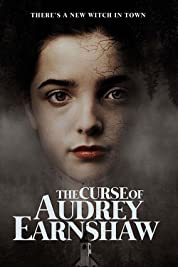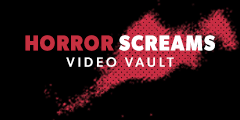BLOOD HARVEST (a.k.a. The Curse Of Audrey Earnshaw / The Ballad Of Audrey Earnshaw) *** Canada 2020 Dir: Thomas Robert Lee. 93 mins
 Afforded the awful new title of BLOOD HARVEST (which already belongs to a memorably bonkers 80s Tiny Tim slasher flick) instead of its original, more appropriate THE BALLAD OF AUDREY EARNSHAW moniker, this atmospheric sophomore feature from writer-director Thomas Robert Lee screened at Fantasia as THE CURSE OF AUDREY EARNSHAW.
Afforded the awful new title of BLOOD HARVEST (which already belongs to a memorably bonkers 80s Tiny Tim slasher flick) instead of its original, more appropriate THE BALLAD OF AUDREY EARNSHAW moniker, this atmospheric sophomore feature from writer-director Thomas Robert Lee screened at Fantasia as THE CURSE OF AUDREY EARNSHAW.
In the late 1950s a pestilence swept through a remote Protestant community, with the exception of the farmstead of Agatha Earnshaw (Catherine Walker), where she gives birth, in secret, during an eclipse and is widely suspected of heresy. She keeps her daughter Audrey (Jessica Reynolds) hidden for years, feeding her scare stories of visiting “villains” while shielding her from the outside world. While the wider community starves and buries their dead kids, Agatha refuses to offer them help on the basis that she shouldn’t help one if she can’t help them all. Superstition and paranoia, running parallel with economic ruin and crop failure, sparks more dramatic events when Audrey’s presence (and seemingly supernatural abilities) are revealed.
As director, Lee offers a suitably depressing, sparse backdrop, the colour seemingly bled from the frame as he effectively evokes a desperately flailing community living in constant fear. A sense of growing rage from the townsfolk alternates with Reynolds’ coming of age and authentically harrowing scenes of incidental characters suffering insurmountable physical and mental decline. The film is punctuated by occasional, startling gruesome moments (disembowelled livestock, a graphic throat slashing) but avoids conventional horror shocks and tricks in favour of a deliberately paced sense of omnipresent dread.
Reynolds is convincingly alienated as the powerful, hitherto concealed teenager, and Walker authentically portrays her persecuted, mistrusted mother. There are obvious echoes of recent, successful attempts at rekindling the spirit of folk horror (including THE VVITCH) while the conclusion echoes at least one major player from the 60s/70s American occult horror cycle. It’s a little too ponderous to be truly compelling and there are weaker performances in the supporting cast – but it’s still a commendably serious, mature and eerie mood piece and clearly bodes well for the filmmaker’s future in or out of the genre.
Review by Steven West
